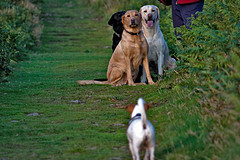We all say empathy is being able to put ourselves in anothers shoes, but do we?

A simple definition (I think), for having the actual ability, motivation, and desire to see, feel, understand and perceive the world through the eyes of a fellow human being.
A little share…
Yesterday I met a close friend who on Saturday had to put their animal companion of 16 years to sleep.
If you’ve been there, you know how devastating and painful this decision is, (we all know how pets wash our souls with unconditional love and touch parts of us we never knew were empty, yes, been there too).
Their boss however doesn’t understand why they are so upset, or why my friend needs to take a couple of days out of work, it was ‘just a dog’.
Are they completely unconscious and unaware of the grief that is attached to my friends experience, do they really believe ‘getting back to work, will help them get over it quicker’.
That example is just a metaphor.
I’m not judging their boss, I’m just considering their empathy.
In writing this post I came across an article by John Marshalls Edwards The Empathy Paradox, which led me to watch his talk “The Global Urgency of Everyday Empathy” on Ted Talks, if you have time, please watch, it’s good.
The opening line to The Empathy Paradox (and the premise of his talk is) “I passionately argued that era of empathy is now upon us.”
And I agree with him.
I don’t know about you, but I hadn’t even heard of the word empathy in my childhood. Sympathy yes, but the two are not the same.
Can empathy be taught?
We can teach the theory and definition sure, but is it a skill that can actually be learned?
How would the world be different if we all showed more empathy?
Us humans, (unlike other animals) can look in a mirror and recognise ourselves, it’s at this point (around 3/4 years) when our ability to be empathic emerges. We learn that we’re an individual, that we aren’t all the same, that we are unique and different.
Empathy is about paying attention to another human being, giving them our focus and asking ‘what are they feeling?‘, ‘why are the feeling this way?’ and making a commitment to understanding what is happening in their world.
Unlike sympathy, empathy doesn’t require you ‘step into’ their world and feel what they are feeling.
Unlike sympathy, empathy doesn’t require that you have the same values and beliefs, it only ask s that you try to understand from another perspective.
If we all empathised more, I wonder what would happen? What kind of world would we be living in?
- Less conflict?
- Better relationships?
- More effective communication?
- Greater trust?
- Deeper compassion?
How can we develop our empathic skills?
Pay attention. Recognise that all the feelings you have are present in another human being.
Acknowledgement (without sympathy). Validate what the person is feeling i.e. ‘I can see your really angry’ or ‘I can feel that you are incredibly upset’.
We’re all in this together. ‘This’ being living and life. Compassion is free.
Stay motivated. During a day we probably come into contact with hundreds of people: from family to friends to workmates to the person serving us at the supermarket. Be present at each social interaction. You don’t tire being empathic, but sympathetic, yes.
Share. Ask people to ‘tell you more’.
How do you feel when someone shows you empathy as opposed to sympathy?
Photo Credit: Katerha on Flikr (many thanks)
 However, feelings are never the root or cause of a problem.
However, feelings are never the root or cause of a problem. To some, when assertiveness or ‘asserting yourself’ is mentioned it conjures up a lot of negativity, simply because assertiveness (positive) is confused with aggression, it is not the same.
To some, when assertiveness or ‘asserting yourself’ is mentioned it conjures up a lot of negativity, simply because assertiveness (positive) is confused with aggression, it is not the same.